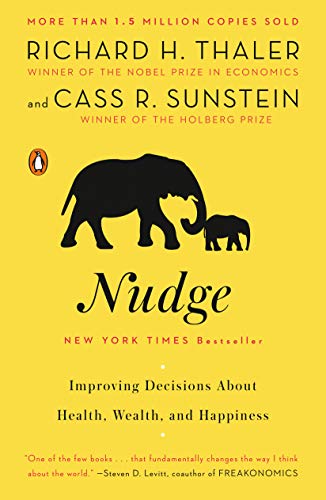Overview of “Nudge: Improving Decisions About Health, Wealth, and Happiness” Link to heading
Summary Link to heading
“Nudge: Improving Decisions About Health, Wealth, and Happiness,” authored by Richard H. Thaler and Cass R. Sunstein, explores the concept of choice architecture and the idea of libertarian paternalism. The book delves into how small design changes in the environment can significantly influence individuals’ decisions in positive ways. It focuses on the ways in which “nudges” can help improve decisions related to health, wealth, and happiness without restricting freedom of choice. The authors examine a wide range of topics, including savings, healthcare, marriage, and environmental considerations, illustrating how nudging can lead to better outcomes on both individual and societal levels.
Review Link to heading
“Nudge” has been praised for its accessible writing style and engaging content, making complex behavioral economics theories comprehensible to a wide audience. The book’s core strength lies in its practical application of psychological research to real-world problems, encouraging policymakers and individuals to consider how they can subtly guide choices in beneficial directions. Some critiques of the book focus on the ethical implications of nudging and the potential for manipulation. However, overall, Thaler and Sunstein have been widely acclaimed for sparking meaningful discussions on consumer behavior and decision-making processes.
Key Takeaways Link to heading
- Choice Architecture: Small changes in how options are presented can significantly impact decision-making.
- Libertarian Paternalism: It is possible to influence choices while still respecting freedom, improving outcomes without coercion.
- Default Options: Setting beneficial defaults can lead to better decisions, as many tend to go with the “path of least resistance.”
- Disclosure and Feedback: Providing clear information and timely feedback can help individuals make informed decisions.
- Social Influence: People’s behavior is often heavily influenced by what others do, which can be harnessed to promote beneficial practices.
Recommendation Link to heading
“Nudge” is highly recommended for policymakers, business leaders, educators, and anyone interested in understanding decision-making processes and behavioral economics. It provides insightful strategies for encouraging positive choices in various domains without limiting personal freedom. Whether you’re aiming to design better public policies or simply make more informed personal decisions, this book offers valuable perspectives and concrete ideas to consider.
